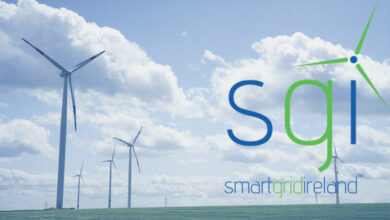Towards greater security and sustainability in offshore energy
 Alan Bissett and David Trethowan, Arthur Cox, summarise how the licensing system for offshore renewables will operate.
Alan Bissett and David Trethowan, Arthur Cox, summarise how the licensing system for offshore renewables will operate.
Although Northern Ireland’s geographic location on the periphery of Europe has lent itself to a traditional dependency on fuel imports to meet our energy needs, the landscape is changing as we diversify away from fossil fuel based generation – both literally and figuratively.
We benefit from a strong renewable resource and over the past years the roll out of renewable generation onshore has increased at a pace. Indicators show that electricity consumption from renewable sources stood at an average of 12 per cent during 2011, with some months achieving as high as 18 per cent.
Although this is certainly encouraging, the push to meet the ambitious target of 40 per cent renewable energy in the overall mix by 2020 continues. Given this challenge, it is unsurprising that the vast opportunities available from harnessing the power of the wind and waves in the offshore region for the generation of energy would be eventually developed. Such developments are hoped to increase our electricity security and diversity as well as reducing our carbon output and exposure to fossil fuel price volatility.
The Department of Enterprise, Trade and Investment (DETI), which has devolved powers in relation to energy policy in Northern Ireland, published an overarching Strategic Energy Framework (SEF) in 2010. This set out a vision for a sustainable system where energy is used as efficiently as possible; where most of Northern Ireland’s energy is from renewable sources; and where Northern Ireland ensures that all generation is as competitively priced as possible. The SEF also identified the four key goals of competitiveness, security of supply, sustainability and creating a robust and flexible energy infrastructure.
In delivering these objectives, onshore wind is expected to continue as the principal source of renewable electricity generation in the short to medium term, although how the energy mix will look in 2020 will depend on market and investor decisions. However, it is clear that offshore wind and wave facilities will form a part of this mix.
Northern Ireland Offshore Leasing Round
Significant steps forward have been taken in making the development of offshore generation in Northern Ireland territorial waters a reality. The Crown Estate, which owns the seabed out to the 12 nautical mile limit around the United Kingdom, announced its plans to offer development rights, following a tender process, over specific areas of Northern Ireland territorial waters in March 2011.
Against the backdrop of the SEF, DETI developed an Offshore Renewable Energy Strategic Action Plan (ORESAP) which was also the subject of a strategic environmental assessment. The ORESAP, which was published in March
2012, identified a range of actions which could be taken to facilitate the development of at least 600MW of offshore wind and 300MW of tidal energy by 2020.
Piecing together the regulatory framework
Although Northern Ireland has an established licensing and consents regime for onshore generation facilities, the considerations are broader when it comes to the construction, operation and, eventually, the decommissioning of generation facilities out at sea. In this regard, an offshore licensing and consents regime is currently being developed to ensure effective regulation for the complete lifespan of these facilities.
Once a Crown Estate lease has been granted over the designated operation areas of the seabed, it is expected that the usual consent to construct a generating station from DETI and a generation licence from the Utility Regulator (NIAUR), both as provided for under the Electricity (Northern Ireland) Order 1992, will be required for the facilities. Planning consents will be required under the Planning (Northern Ireland) Order 1991 for any associated onshore works or ancillary development which extends landward of the mean low water springs mark which is the limit of Northern Ireland planning regulation.
For the area seaward of that mark, the Marine and Coastal Access Act 2009 licensing and consents regime will be used. This Act introduced a new marine licensing system for activities carried out in the marine area across the United Kingdom. The Northern Ireland Environment Agency (part of the Department of the Environment) will be the licensing and enforcement authority for Northern Ireland territorial waters. The marine licence draws together environmental, human health and navigational safety factors as well as the interests of other users of the sea.
Due to environmental concerns and as a prerequisite for the issuance of a marine licence, it is likely that an Environmental Impact Assessment (EIA) will be required as well as a Habitat Regulations Assessment. Further, all marine licence applications must be made available for public consultation.
Once construction has been completed, the operation of the facility will be regulated pursuant to the terms of a generation licence granted by NIAUR to the generator. Associated distribution and transmission networks which will connect the facility to the onshore grid may also be subject to a NIAUR distribution or transmission licence if appropriate.
Other regulatory provisions are also to be considered, for example navigational safety in the sea around offshore facilities and in the airspace above them. As these facilities have an operational lifespan, the decommissioning and removal regime will be of great importance to ensure the operation area is returned to its previous state once generation activities have ceased.
The full effectiveness of the proposed offshore generation will depend on whether the onshore distribution and transmission networks, including interconnection, will be sufficient to take on the levels of intermittent capacity which is suggested. Substantial investment and expansion of these grids is required to ensure a free flow of unconstrained electricity into the Northern Ireland grid for use or export.
A bright future
It would seem that although our geographic position may have been a hindrance in the past, through our marine zone it will provide us with an opportunity to ensure a greater security of supply in the Northern Ireland energy market by further diversifying our energy mix. It will also enhance Northern Ireland’s progress towards being a green energy hub and is hoped that it will create supply chain opportunities for local businesses. All in all, this is a positive step forward for our local energy market, economy and for Northern Ireland as a whole.
Alan Bissett is the lead Partner and David Trethowan is an Associate in Arthur Cox’s Projects and Energy Group





